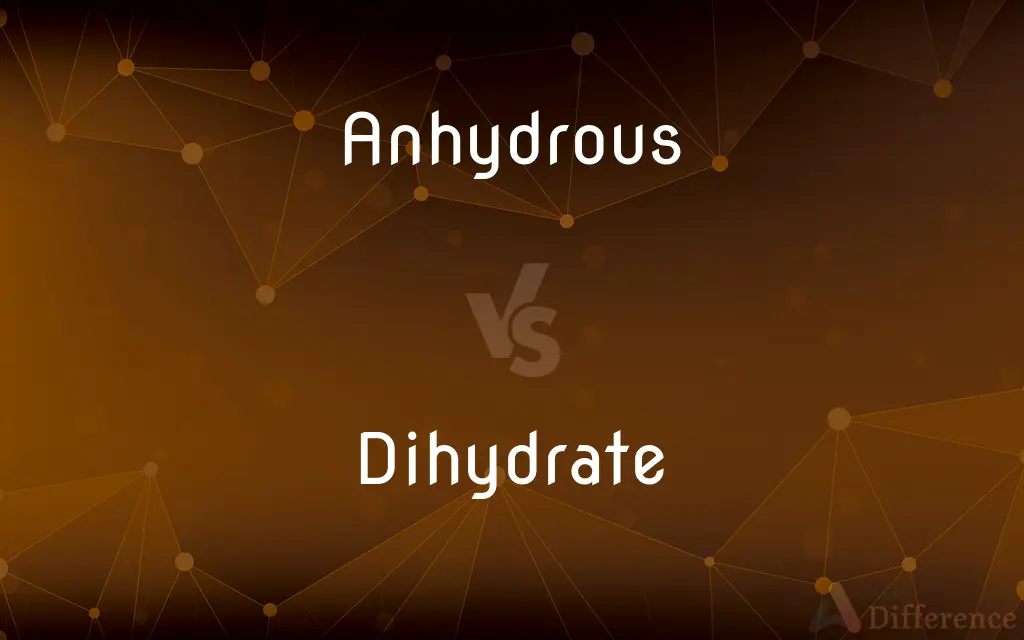Anhydrous vs. Dihydrate — What's the Difference?
Edited by Tayyaba Rehman — By Fiza Rafique — Updated on September 30, 2023
Anhydrous refers to substances without water, while Dihydrate indicates compounds containing two molecules of water. Both terms describe water content.

Difference Between Anhydrous and Dihydrate
Table of Contents
ADVERTISEMENT
Key Differences
Anhydrous compounds are characterized by their lack of water molecules in their structure, making them "water-free." On the other hand, Dihydrate compounds specifically have two water molecules associated with every formula unit. Their difference is in the presence or absence of these water molecules.
The word Anhydrous is derived from Greek, meaning "without water." This is indicative of its nature and signifies substances that are devoid of water. Dihydrate, as the prefix "di-" suggests, carries two molecules of water in its structure, which can be vital for the properties of the compound.
In the realm of chemistry, an Anhydrous substance can exhibit quite different properties compared to its hydrated counterparts. Similarly, a Dihydrate substance might behave differently than its anhydrous or other hydrated forms, due to those two molecules of water in its composition.
Comparison Chart
Meaning
Without water
Contains two molecules of water
Derived from
Greek term for "without water"
Prefix "di-" signifies two
ADVERTISEMENT
Chemical Behavior
Might differ significantly from hydrates
Behavior can be different due to bound water
Conversion
Can become hydrated when exposed to moisture
Can become anhydrous when heated
Usage in Industry
Preferred for moisture-sensitive reactions
Can be more suitable due to bound water
Compare with Definitions
Anhydrous
Anhydrous compounds are devoid of water molecules.
The Anhydrous form of copper sulfate is white.
Dihydrate
Dihydrate denotes the presence of two molecules of water.
Gypsum is calcium sulfate Dihydrate.
Anhydrous
Anhydrous means lacking water in its structure.
Anhydrous sodium sulfate is a common drying agent in labs.
Dihydrate
Dihydrate compounds contain two water molecules.
Copper sulfate Dihydrate is blue in color.
Anhydrous
Anhydrous refers to the absence of bound water.
Anhydrous calcium chloride is a desiccant.
Dihydrate
Dihydrate substances have two water molecules per formula unit.
Epsom salts are magnesium sulfate Dihydrate.
Anhydrous
Anhydrous is the term used to describe a water-free state.
Anhydrous ammonia is used as a refrigerant.
Dihydrate
Dihydrate represents compounds with two bound water entities.
Borax is often found as a Dihydrate mineral.
Anhydrous
Anhydrous substances have had their water content removed.
Anhydrous ethanol has almost no water content.
Dihydrate
Dihydrate signifies the hydration level of a substance.
The Dihydrate form of a compound often has distinct physical properties.
Anhydrous
A substance is anhydrous if it contains no water. Many processes in chemistry can be impeded by the presence of water; therefore, it is important that water-free reagents and techniques are used.
Dihydrate
(chemistry) A hydrate whose solid contains two molecules of water of crystallization per molecule, or per unit cell
Anhydrous
Without water, especially water of crystallization.
Anhydrous
Having little or no water.
Anhydrous
(chemistry) Having no water of crystallization.
Anhydrous
Destitute of water; as, anhydrous salts or acids.
Anhydrous
Without water; especially without water of crystallization
Common Curiosities
How many water molecules are in a Dihydrate compound?
A Dihydrate compound contains two water molecules.
How can you convert a Dihydrate compound to its Anhydrous form?
Typically, by heating the Dihydrate compound to remove its bound water.
What does Anhydrous signify in chemistry?
Anhydrous indicates that a substance is without water or water-free.
Is Anhydrous ammonia completely devoid of water?
Yes, Anhydrous ammonia is almost 100% pure ammonia without water.
How is the term Dihydrate different from "hydrated"?
Dihydrate specifies two water molecules, while "hydrated" is a general term and doesn't specify the number.
Are the properties of Anhydrous and Dihydrate forms of a compound the same?
No, their properties can differ due to the presence or absence of water molecules.
Can a Dihydrate substance be converted back to Anhydrous by just exposing it to air?
No, usually specific conditions, often heating, are required.
Why might a Dihydrate salt look different from its Anhydrous counterpart?
The bound water in the Dihydrate form can influence its physical properties, such as color.
Is Anhydrous ethanol completely free of water?
Anhydrous ethanol is nearly 100% ethanol, but trace amounts of water might still exist.
Why is the term Anhydrous important in reactions?
Because Anhydrous conditions can be critical for moisture-sensitive reactions.
Which form, Anhydrous or Dihydrate, is more stable in open air?
It depends on the compound and the conditions; some Dihydrates are more stable, while others may revert to their Anhydrous forms.
What is the significance of the prefix "di-" in Dihydrate?
The prefix "di-" denotes the number two, indicating two molecules of water.
Can Anhydrous substances absorb water from the atmosphere?
Yes, some Anhydrous substances are hygroscopic and can absorb moisture.
Share Your Discovery

Previous Comparison
Freezing vs. Frozen
Next Comparison
Legitimate vs. LegitAuthor Spotlight
Written by
Fiza RafiqueFiza Rafique is a skilled content writer at AskDifference.com, where she meticulously refines and enhances written pieces. Drawing from her vast editorial expertise, Fiza ensures clarity, accuracy, and precision in every article. Passionate about language, she continually seeks to elevate the quality of content for readers worldwide.
Edited by
Tayyaba RehmanTayyaba Rehman is a distinguished writer, currently serving as a primary contributor to askdifference.com. As a researcher in semantics and etymology, Tayyaba's passion for the complexity of languages and their distinctions has found a perfect home on the platform. Tayyaba delves into the intricacies of language, distinguishing between commonly confused words and phrases, thereby providing clarity for readers worldwide.
















































